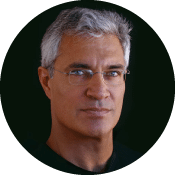Parvati Magazine interviewed Louie Psihoyos, Executive Director of the Oceanic Preservation Society (OPS), and discussed using mass media to inspire change.
Parvati Magazine: What is OPS and why did you found it?
Louie Psihoyos: OPS was founded as an organization using mass media to inspire change. To create a tipping point, you only need about 10% of the population, the early adopters, the politicians, the people who really sway change. People are paying attention to films rather than print media and I saw documentaries are a way to change the DNA of the people we need to create the change.
OPS was started by myself and Jim Clark who’s kind of like the Steve Jobs in our era. We spent a lot of time photographing reefs around the world and we’d come back a few years later and see this degraded environment. He said we should do something about this. So I said “how about you and I, we’ll use your money and my eye and make films.” The Cove was our first film and it became the most winning documentary in history, but more important than that it changed things in Japan.
PMAG: What level of success has The Cove had in the fight to stop the dolphin killing?
LP: The movie galvanized a lot of animal rights groups like Sea Shepherd and I could see the power of film to make change. They were killing about 23,000 dolphins and porpoises per year and are now killing less than 6000. We distributed a copy of the film in Japanese to everyone living in Taiji. After that, the Mayor said dolphin meat demand dropped by about 60% in just a few weeks. The film continues to do its work, not just saving dolphins lives, but keeping them out of captivity.
PMAG: Your film Racing Extinction warns we are potentially on the brink of the sixth mass extinction. What are the key indicators?
LP: The canary in the coal mine is the disappearing coral reef. A mass extinction event is when you lose half or more of all the species on the planet. Previous to all the mass extinction events you lose the coral reefs because of the large uptake in carbon dioxide and that’s what’s going on right now. Except this time the carbon dioxide uptake is not because of an asteroid, or massive volcano eruptions all over the planet, but man-made. What we are trying to do with movies like The Cove and Racing Extinction, is not just try to preserve and to create awareness, but the dream is once people see what we are going to lose, they will make an effort to stop it.
PMAG: I loved your message in the film “start with one thing”. Can you discuss what are some of your favorite things?
LP: The average person in America eats about 10,000 animals in their lifetime. The raising of meat for human consumption creates more direct emissions then all the tailpipe exhausts from all the planes trains and automobiles on the planet. So if you want to fix the planet, change your diet. The next film I’m working on with James and Suzy Cameron is about nutrition and top athletes. All proteins are not created equal, more and more top athletes are getting an edge by adopting a vegan diet, the world’s strongest man is vegan.
When I lived in Colorado, I generated 140% of our energy off the roof of my home with solar panels which are 6 times cheaper now than when I bought them, and that generated the energy I needed for OPS, and my home. And 140% energy production means I’m getting back 40% in terms of cash, I was making money!
We want people to realize everyone can make a difference when they vote with their money, by what they’re putting in their mouth’s, what they’re bringing home, all these choices have an environmental effect that’s where we needed to get people to focus on. Because if you change yourself you change the world.












